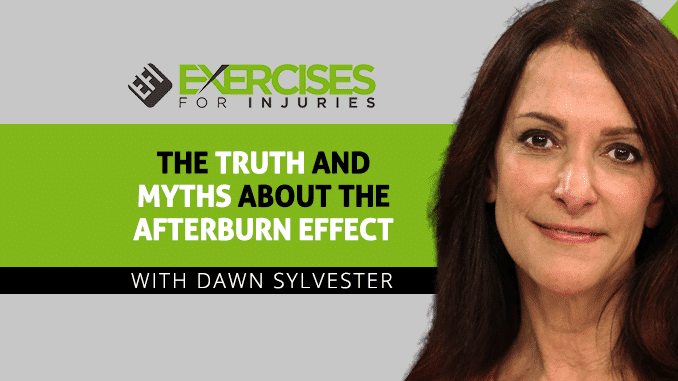
I was at the local coffee shop and came across this sign that cracked me up:
Today, I will be sharing the continuation of the interview I shared yesterday with Dawn Sylvester. In this second part of the interview, Sylvester talked about the myth around the afterburn effect.
CLICK HERE to watch the YouTube video interview.
In the interview above, you will discover:
- How do oxygen intake levels affect the body’s fat-burning potential
- How can hormones aid in weight loss
- Can stress cause weight gain?
- The truth and myths about the afterburn effect
- Two ways to turn negativity into positivity
I hope you enjoyed the interview. If you missed the first part of the interview, you could check it out here.
Take care!
Rick Kaselj, MS
We’ve all heard of the “afterburn effect” from countless fitness and nutrition books, magazines, and TV shows. But have you ever wondered what the reality of the afterburn effect is? Meanwhile, many still believe that the afterburn effect is what your body needs to burn calories or fat stores. However, the afterburn effect is the amount of oxygen required to return the body to its resting state.
The afterburn effect is a phenomenon where the benefits of exercise continue for a while after you stop exercising. It’s not a myth, and there’s no reason to think it’s a myth. Exercise improves cardiovascular fitness, which in turn reduces resting heart rate. This impacts the overall amount of blood flowing through the body at rest, which means the body has less to do during the day, and therefore, it can devote more resources towards recovery. In other words, the body can recover faster and better than before.
How Oxygen Intake Levels Affect The Body’s Fat-Burning Potential
Most people don’t know that oxygen intake plays a major role in fat-burning potential. Our bodies need oxygen to maintain a healthy metabolism. That’s why we often hear about the importance of deep breathing, drinking plenty of water, and exercising. When your body is low on oxygen, the body will shift into ketosis, often referred to as “starvation mode.” This shift will slow the metabolism and make it challenging to burn off fat.
Oxygen affects ketosis by stimulating the release of fat-burning hormones like norepinephrine, epinephrine, and cortisol. These hormones stimulate energy production in cells with a high rate of oxidation. In other words, when your body has access to more oxygen, it tends to release more of these hormones. By contrast, when there’s less oxygen available, the body will go into a ketosis state. It will store fat instead of burning it.
The body burns fat stores as fuel for energy. The more intense the workout, the more afterburn will occur. When the workout is completed, the body uses the fat stored in the muscles and tissues to fuel energy. When the fat is burned, it produces more carbon dioxide, which causes the body to breathe out faster than usual. Thus, when you run out of oxygen, the rest of your body goes on overdrive to supply that much-needed oxygen to your muscles. After the exercise, the body begins to produce more adrenaline to get rid of the excess carbon dioxide and water.
How Can Hormones Aid in Weight?
The idea that hormones can help with weight loss is barely a decade old, but it’s becoming increasingly popular. Hormones are chemicals released from the endocrine system into the bloodstream that control everything from growth to mood, energy levels, and sleep patterns. When the body functions well, hormones are produced appropriately for the functions they serve.
The highest concentration of hormones in the body can be found in fat tissue. Hormones are released from this fat tissue so that obesity can increase the risk of certain diseases, such as diabetes and high blood pressure. The hormones are stored in this area to help serve as a “buffer” when the body requires a boost in other parts of the endocrine system, such as during times of increased stress or illness.
What does this mean for weight loss? Hormones released from fat tissue may help us gain or lose weight, depending on the body’s needs. Lower-weight individuals may produce too little hormone, but if they’re not gaining weight, they are likely in a stage of life when their hormones are functioning as they should be.
Can Stress Cause Weight Gain?
There are so many myths and misconceptions about weight loss and health, but when it comes to the causes of weight gain, there is no doubt that stress plays a role. When our bodies are under constant stress, they don’t know what to do with the extra energy, so they release it as cortisol or adrenaline into the bloodstream. Cortisol helps your body cope with a stressful situation by increasing blood sugar levels and blood pressure. It is well-established that stress can lead to overeating, even linked with binge eating.
Outlook
As with any exercise program, it’s important to establish your goals. If you want to lose weight and lower your risk of health problems such as heart disease and diabetes, you should consider the benefits of weight loss in that area. If you want to gain weight and improve muscle tone, keep working out with a proper technique, and you will see results.
Although these exercises are safe, they can cause discomfort or muscle soreness if done improperly. Make sure the exercises are performed regularly throughout your program. Start to see how your body reacts and slowly increase the intensity or the number of repetitions. You should look for a nutrition program that is proven to be effective. If you don’t have symptoms of any medical conditions, you can certainly be in better shape by exercising regularly.
Here’s a list of interviews that might interest you:
- 3 Habits of Highly Fit People
- The #1 Worst Exercise That Ages You Faster
- How To Be Physically Tough By Cultivating Mental Toughness
For your guide to the best foods to heal your body, check out The Best Foods that Rapidly Slim & Heal in 7 Days here!



